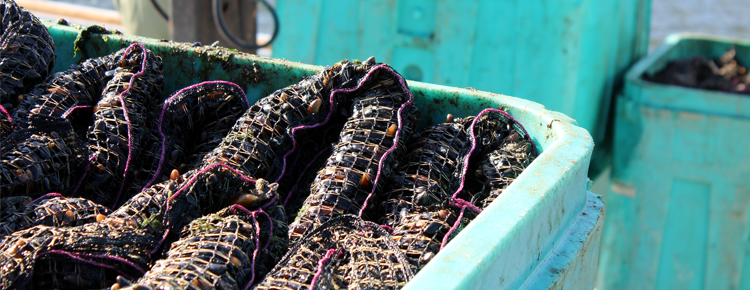
Mussel Socking
From 2000 to 2003, Go Deep International Inc. worked with leaders in the mussel farming industry to develop an improved mussel sock substrate for use in growing mussels that improved the ease of use; decreased labour time; reduced seed loss in handling; and provided an effective substrate for the growing of mussels.
Over the last decade, the Go Deep cotton bisect mussel socking has been a proven product that is widely used in the industry. The Go Deep sock material is ideally suited to the individual-drop growing method that is used in Prince Edward Island, Canada and a number of locations around the world in both longline and raft based farming.
The GDI-CB mussel sock is a square mesh consisting of interwoven monofilament and split film polyethylene with reinforced bands in the sides to increase the strength of the sock. This also eliminates longitudinal elongation of the sock. A known significant benefit is the use of cotton strands that bisect the square mesh openings of the polyethylene.
These cotton strands act to contain the mussel seed during socking, handling / transfer, and attachment to lines which greatly reduces the loss of mussel seed due to shake-out. The cotton strands biodegrade after about three to six weeks, allowing the mussels to migrate out of the sock.
The reinforcement bands and square mesh construction provide significant benefits:
First, the length of the sock does not change and the meshes of the sock remain open, even after the mussels have migrated out of the sock, creating a better structure for byssal thread attachment and reduced fall-off. Other types of mussel socks do not have a fixed length, after the mussel seed migrates to the outside of the sock there is nothing inside the sock to maintain the diameter, as a result the mesh cells close longitudinally and the mussel sock elongates which may cause a problem in shallow water. However, the main disadvantage of these types of socks is that the mesh of cells closes in a lengthwise direction creating a rope like structure with very limited area for byssal thread attachment by the mussels. The fixed cell construction of Go Deep socks ensure that the cells do not close, providing the mussels with a mesh cell sock of uniform length and far superior surface area and structure for byssal thread attachment resulting in significantly reduced fall-off and greater market yields per metre.
Second, the mussel sock tube size (diameter) stays consistent during the socking operation which provides consistent counts of mussels per meter even when inexperienced staff performs this task. Mussel socks that do not have a fixed mesh size can be stretched vertically and horizontally, this means that significant time is required to train the workers filling the socks to control the diameter of the sock to control the number of mussels per metre (stocking density). The consistent diameter of Go Deep mussel socks eliminates this problem, ensuring that all socks have consistent stocking densities. This eliminates significant time for training and density checks and allows companies to increase production volumes using unskilled labour.
Grading and re-socking enables the farmer to achieve consistent yields in terms of mussel size and count per meter which results in a more valuable crop at the market (processing) grading stage.
Third, the reinforcement band that fixes length and diameter also increases the strength of the mussel sock which eliminates the requirement to use a re-enforcing cord or twine to increase the tensile strength of the mussel sock which is frequently required with other mussel socks.
Additionally, through the use of a customized production line and sewing machines, the mussel socks can be supplied in bales of 500 or 1,000 pieces cut and sewn closed at one end, ready for use in the re-socking procedure after grading of the seed stock. These cut and sewn socks reduce the amount of socking material required and significantly reduce the time required to re-sock the seed.
Overall, the GDI-CB mussel socking material has provided our customers with significantly improved seed retention and total return at harvest when compared with re-socking in traditional diamond mesh mussel socks.
You might be interested in:
Floats
Perimeter Marking Buoys
- GDI-0.30M-SPAR
- GDI-0.90M-CAN
- GDI-1.22M-CAN
